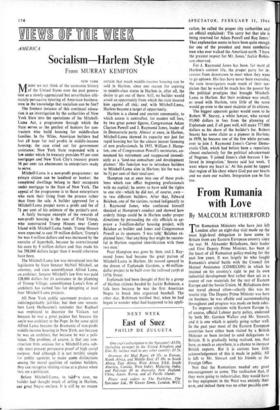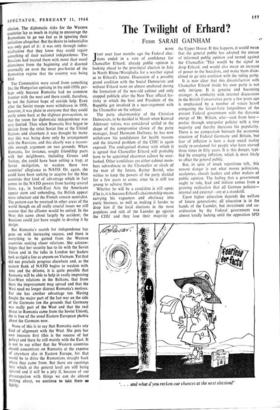From Rumania with Love
By MALCOLM RUTHERFORD
TTHE Rumanian Ministers who have just left London after an eight-day visit made up the most high-level delegation to have come to Britain from any Eastern European country since the war. M. Alexander Birladeanu, their leader and First Deputy Prime Minister, has been at the heart of all Rumanian policy-making for,the past few years. It was largely he who fought Rumania's crucial battle with the Council for. Mutual Assistance (COMECON) in which he insisted on his country's right to put its own industrial development first rather than act as a source of raw materials for the rest of Eastern Europe and the Soviet Union. M. Birladeanu does not travel abroad often—clearly this was no tourist trip. The Deputy Prime Minister was here on business; he was affable and accommodating throughout and progress was made on both sides. To improve relations with Eastern Europe is, of course, official Labour party policy, endorsed by both Mr. Gordon Walker and Mr. Stewart, and it is one which is quietly going rather well. In the past year most of the Eastern European countries have either been visited by a British. Minister or been invited to send delegations to Britain. It is gradually being realised, too, that here, as much as anywhere, is a chance to increase British exports. But it is curious how little acknowledgement of this is made in public. All is left to Mr. Stewart and his friends at the Foreign Office. Not that the Rumanians needed any great encouragement to come. The realisation that, if they were going to industrialise, they would have to buy equipment in the West was entirely their own, and indeed there was no other possible con-
elusion. The diplomatic risks for the Western countries lay as much in trying to encourage the Rumanians to go too fast as in ignoring their initiatives altogether. But the desire to industrialise was only part of it : it was only through indus- trialisation that they knew they could regain something of their national independence. The Russians had treated them with more than usual clumsiness from the beginning and it dawned eventually on even the most pro-Soviet of the Rumanian regime that the country was being bled.
The Communists were saved from something like the Hungarian uprising in the mid-1950s per- haps only because Rumania had no common frontier with the west and there could, therefore, be not the faintest hope of outside help. Even after the Soviet troops were withdrawn in 1958, however, it was plain to everyone that they could easily come back at the slightest provocation, so that the room for diplomatic independence was very limited. Thus when Rumania first began to deviate from the strict Soviet line at the United Nations and elsewhere it was thought by many that this was being done only by arrangement with the Russians, and this clearly was a reason- able enough argument on two grounds. When Rumania, for instance, sought friendship pacts with her neighbours, including Greece and Turkey, she could have been setting a trap, at Soviet instigation, to weaken these two countries' allegiance to NATO. Or, again, she could have been seeking to acquire for the bloc countries that kind of advantage which in fact comes to the NATO powers from having several faces, e.g., in South-East Asia the Americans appear stern and unbending, the British appear more reluctant and the French remain neutralist. The pattern can be reversed in other areas of the world though on all really crucial issues we still assume that the alliance would be united. In the West this came about largely by accident; the Russians could just have sought to develop it by design.
But Rumania's search for independence has gone on with increasing success, and there is everything to be gained from the Western countries seeking closer relations. She acknow- ledges that her security has to lie with the Soviet Union and in the talks in London her leaders took as rigid a line as anyone on Vietnam. Yet that did not preclude progress elsewhere and, as the eastern flank of NATO begins to weaken with time and the détente, it is quite possible that Rumania will be able to help in vastly improving East-West relations in the Balkans, that from there the improvement may spread and that the West need no longer distrust Rumania's motives. For she has another advantage too. Having fought the major part of the last war on the side of the Germans (on the grounds that Germany was really part of the West and that the real threat to Rumania came from the Soviet Union), she is free of the usual Eastern European phobia about the Germans now.
None of this is to say that Rumania seeks any kind of alignment with the West. She puts her own interests first (this is the success of her policy) and these lie still mainly with the East. It is not to say either that the Western countries should concentrate on Rumania at the expense of anywhere else in Eastern Europe, for that would be to drive the Rumanians straight back where they came from. But there are openings here which at the general level are still being ignored and it will be a pity if, because of our preoccupation with things we can do almost nothing about, we continue to take them so



































 Previous page
Previous page